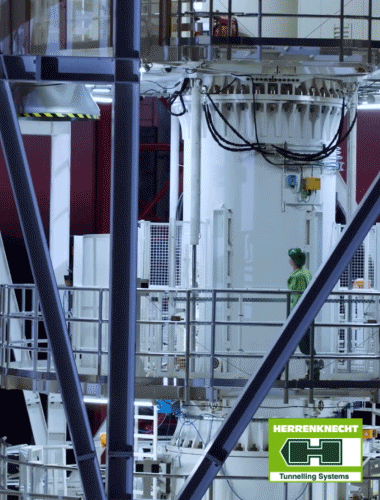Riyadh Metro win for Spanish-led group
29 Jul 2013
Shani Wallis, TunnelTalk
- One of three major construction contracts for delivery of three lines of the six-line Riyadh Metro in Saudi Arabia has been awarded to a consortium led by FCC of Spain. Consortium partners include Samsung (Korea), Alstom (France), Strukton (The Netherlands), Freyssinet Saudi Arabia and engineering companies Typsa (Spain) and Setec (France). The contract is valued at €6.07 billion and includes the design and construction of Lines 4 (Orange), 5 (Yellow) and 6 (Purple) for a total of 64.6km of track and 25 stations. The alignments include 26.6km underground, 29.8km on viaducts, and 8.2km at grade. FCC will use three TBM of about 10m diameter to build single-tube, double track tunnels on the three lines to provide trackway for two-car conductorless train sets supplied by consortium partner Alstom.
-

Contract is for three lines of nearly 65km
- Construction of the six-line metro system for Riyadh, at 176km, is one of the largest public works projects in the world at present with an estimated budget of more than €16.3 billion. It will be the longest metro system in the world under construction at the same time with award also of two further construction contracts awarded to groups led by Bechtel of the USA and Ansaldo of Italy. The procurement process commenced in July 2012, when 37 consortia comprising world leaders in construction, rolling stock and railway systems, presented expressions of interest.
- On receiving the news, Juan Béjar, Vice-President and CEO of FCC said, "the Riyadh metro contract consolidates the international reputation of Spanish companies in global civil engineering projects. FCC's references were instrumental in our successful bid for this project. The Riyadh Metro contract dovetails perfectly with FCC's new international strategy in construction, which is focused on infrastructure and on countries where we can best leverage our capabilities."
- Construction of the project will require 600,000 tonnes of steel (80 times the amount of steel used to build the Eiffel Tower in Paris) and 4.3 million cubic metres of concrete (11 times the amount used for Burj Khalifa, the world's tallest skyscraper) and will employ more than 30,000 workers. More than half of these resources will be used on the contract awarded to the consortium led by FCC.
- Riyadh currently has a population of 5.7 million, which is expected to increase to 8.3 million by 2030. The subway is a solution to daily traffic problems. Of 7.4 million daily commutes at present, only 2% use public transport.
- For FCC, this contract in Riyadh strengthens the company's presence in Saudi Arabia, where it has operated for more than two years via FCC Aqualia which has been working to optimise Riyadh's water supply network that now measures more than 6,000km. This project has created 160 jobs and will improve the services provided to more than 3 million people.
- The FCC Aqualia contract was the first water management contract granted to a Spanish company in the Middle East. FCC Aqualia followed this with another contract in the same market some months later, for the operation and maintenance of the sewers and sewage treatment system in the emirate of Abu Dhabi.
- FCC also has offices in Qatar and Kuwait. In Qatar, it is currently building two pedestrian walkways as well as Phase II of the Barzan camp housing development in Al Wajba, 15km from the capital city.
- FCC has extensive experience of building metro systems throughout the world. It participated in construction of the Lisbon Metro (Alameda-Expo section) and in the extension of Line 2 of the Athens Metro, which includes construction of two new stations at Periteri and Anthoupoli, and worked also on the Delhi Metro in India.
- The company is currently building Line 1 of the Panama Metro, worth more than €1 billion; the Toronto-York Spadina Subway Extension in Canada, which includes construction of the north tunnels and the Highway 407 Station under a contract value of €304 million; section 1 of Line 5 for the Bucharest Metro in Romania for €267 million; the Malaga Metro; and Line 8 for the Barcelona Metro.
- FCC also built extensions to the Madrid Metro, including Line 10, Line 8 (Barajas-T4), and Line 3 from Legazpi to Villaverde, as well as sections I and III of Metrosur. In Barcelona, the company built several sections of Metro Lines 2, 5 and 9.
-
Metro Riyadh moves into construction - TunnelTalk, July 2013
Prequalifiers selected for Riyadh metro works - TunnelTalk, September 2012
Current and planned tunnelling activity for Delhi Metro - TunnelTalk, July 2008
First TBM launches on Panama metro drive - TunnelTalk, February 2012
Tunneling to commence in Toronto - TunnelTalk, May 2011
|
|
|
|
|
Add your comment
- Thank you for taking the time to share your thoughts and comments. You share in the wider tunnelling community, so please keep your comments smart and civil. Don't attack other readers personally, and keep your language professional.

